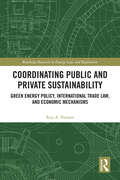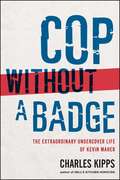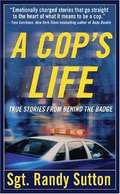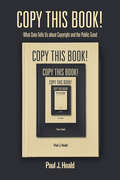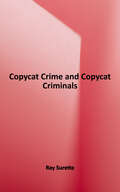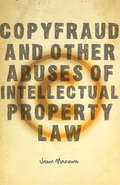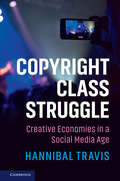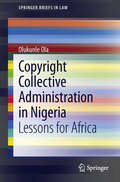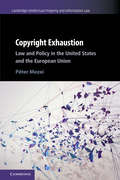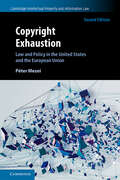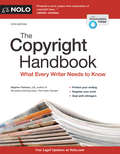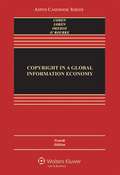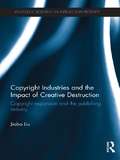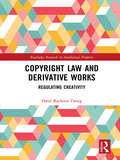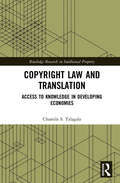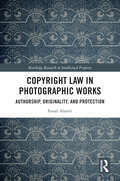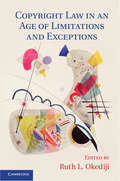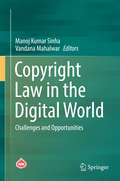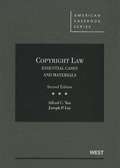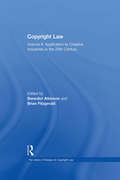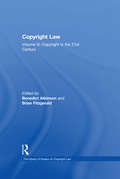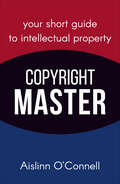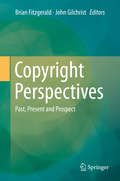- Table View
- List View
Coordinating Public and Private Sustainability: Green Energy Policy, International Trade Law, and Economic Mechanisms (Routledge Research in Energy Law and Regulation)
by Roy PartainThis book demonstrates the need to coordinate private and corporate actors with national and global sustainable climate policies, with conventions in the spheres of green energy laws, as well as from the spheres of commercial, trade, and other private law. While many states have joined together in the Paris Agreements in support of green energy policies, it remains a stark reality that most of the efforts to reduce greenhouse emissions remain with private actors who operate the various industries, vehicles, and vessels that emit the gases in target. The risks of anthropogenic climate change cannot be solved by environmental law alone and will need complementary support from commercial, corporate, and private law. However, aspects of commercial law, securities law, and trade law can be shown to frustrate certain aspects of green energy policies, resulting in damaging "green paradoxes". It raises issues associated with corporate social responsibility and green paradoxes, with international trade laws, and with liability risks for misrepresenting the state of feasible green energy technologies. The book will be of interest to students and scholars in the fields of energy law, environmental law, and corporate law.
Cop Without a Badge: The Extraordinary Undercover Life of Kevin Maher
by Charles KippsWhat's the difference between a cop and Kevin Maher? Kevin doesn't have a badge. And he doesn't play by the rules. Cop Without A Badge tracks confidential informant Kevin Maher as he helps the NYPD, the FBI, and many other law enforcement agencies solve cases that range from robbery to extortion to homicide. In the process, Kevin becomes the highest paid CI the DEA ever had. But Kevin's motives are more complicated than simply money. Having been arrested for Grand Theft Auto at the age of sixteen, his felony conviction prevents him from being what he always wanted to be: a police officer. So now he's out to prove to himself he truly is what he could've been. A cop. Even without a badge. Kevin Maher was 39 years old and living in New Jersey in 1996 when Cop Without A Badge was first published. Maher now works as a private investigator in the state of California.
Cop's Life: True Stories From Behind The Badge
by Randy Sutton Cassie WellsA COP'S LIFE... is about a midnight call that brings you to a grandmother battered to death in her bed while three punks go running and laughing through the night.... <P> A COP'S LIFE... is about the man in the Ninja outfit who absorbs a full magazine of hollowpoint bullets and still raises his gun to kill you...<P> A COP'S LIFE... is about the honor student, the pride and hope of his family, hanging from a speaker wire, or the baby who dies in your arms, or the people who think you're a hero--or the devil...<P> In this powerful collection of tales from the frontlines, Las Vegas police sergeant Randy Sutton goes beyond the neon into the dark corners of society, putting us into the driver's seat of his cruiser and a job that ricochets from moments of sheer terror to coffee-fueled boredom--with stops on the way at every conceivable act of human folly and depravity. With a poet's touch, and the unflinching realism of a crime scene photograph, A COP'S LIFE is the ultimate depiction of the hardest job there is.
Copy This Book!: What Data Tells Us about Copyright and the Public Good
by Paul J. HealdIn Copy This Book!, Paul J. Heald draws on a vast knowledge of copyright scholarship and a deep sense of irony to explain what's gone wrong with copyright in the twenty-first century. Distilling extensive empirical data to clearly show the implications of copyright laws and doctrine for public welfare, he illustrates his findings with lighthearted references to familiar (and obscure) works and their creators (and sometimes their creators' oddball relations). Among the questions he tackles: How does copyright deter composers from writing new songs? Why are so many famous photographs unprotected orphans, and how does Getty Images get away with licensing them? What can the use of music in movies tell us about the proper length of the copyright term? How do publishers get away with claiming rights in public domain works and extracting unmerited royalties from the public? Heald translates piles of data, complex laws, and mysterious economics, equipping readers with the tools for judging past and future copyright law.
Copycat Crime and Copycat Criminals
by Ray Surette"A comprehensive study of the nature of copycat crime, both past and present, and the forces that drive it"--Provided by publisher.
Copyfight
by Blayne HaggartWidespread file sharing has led content industries - publishers and distributors of books, music, films, and software - to view their customers as growing threats to their survival. Content providers and their allies, especially the U.S. government, have pushed for stronger global copyright policies through international treaties and domestic copyright reforms. Internet companies, individuals, and public-interest groups have pushed back, with massive street protests in Europe and online "internet blackouts" that derailed the 2012 U.S. Stop Online Piracy Act (SOPA). But can citizens or smaller countries really stand in the way of the U.S. copyright juggernaut?To answer this question, Copyfight examines the 1996 World Intellectual Property Organization internet treaties that began the current digital copyright regime. Blayne Haggart follows the WIPO treaties from negotiation to implementation from the perspective of three countries: the United States, Canada, and Mexico. Using extensive interviews with policymakers and experts in these three countries, Haggart argues that not all the power is in the hands of the U.S. government. Small countries can still set their own course on copyright legislation, while growing public interest in copyright issues means that even the United States might move away from ever-increasing copyright protection.
Copyfraud and Other Abuses of Intellectual Property Law
by Jason MazzoneIntellectual property law in the United States does not work well and it needs to be reformed-but not for the reasons given by most critics. The issue is not that intellectual property rights are too easily obtained, too broad in scope, and too long in duration. Rather, the primary problem is overreaching by publishers, producers, artists, and others who abuse intellectual property law by claiming stronger rights than the law actually gives them. From copyfraud-like phony copyright notices attached to the U. S. Constitution-to lawsuits designed to prevent people from poking fun at Barbie, from controversies over digital sampling in hip-hop to Major League Baseball's ubiquitous restriction on sharing any "accounts and descriptions of this game," overreaching claims of intellectual property rights are everywhere. Overreaching interferes with legitimate uses and reproduction of a wide variety of works, imposes enormous social and economic costs, and ultimately undermines creative endeavors. As this book reveals, the solution is not to change the scope or content of intellectual property rights, but to create mechanisms to prevent people asserting rights beyond those they legitimately possess. While there are many other books on intellectual property, this is the first to examine overreaching as a distinct problem and to show how to solve it. Jason Mazzone makes a series of timely proposals by which government, organizations, and ordinary people can stand up to creators and content providers when they seek to grab more than the law gives them.
Copyright Class Struggle: Creative Economies in a Social Media Age
by Hannibal TravisEarning an income in our time often involves ownership of or control over creative assets. Employing the law and philosophy of economics, this illuminating book explores the legal controversies that emerge when authors, singers, filmmakers, and social media barons leverage their rights into major paydays. It explores how players in the entertainment and technology sectors articulate claims to an ever-increasing amount of copyright-protected media. It then analyzes efforts to reform copyright law, in the contexts of 1) increasing the rights of creators and sellers, and 2) allocating these rights after employment and labor disputes, constitutional challenges to intellectual property law, efforts to legalize online mashups and remixes, and changes to the amount of streaming royalties paid to actors and musicians. This work should be read by anyone interested in how copyright law - and its potential reform - shapes the ownership of ideas in the social media age.
Copyright Collective Administration in Nigeria: Lessons for Africa (SpringerBriefs in Law)
by Olukunle OlaThis work explores the operation and regulation of copyright collective management in Nigeria. The nexus between creativity and copyright and how creativity has played a pivotal role in development is explained. The need to balance the interests of authors and users is discussed and the societies representing the interest of copyright owners are illustrated. Further, Nigeria's legal framework for collective management is enunciated from a pre-independence and post-independence perspective. In the course of this regulatory challenges encountered in the administration of collective management organizations, steps so far taken to address the problems, legislative reforms and judicial decisions are discussed. A path to the new regime is chartered. The South African Copyright collective management system is explored and a comparison between the Nigerian and South African system is made. Thereby the need for supervisory and regulatory agencies of government is shown to seek the national interest regarding the collective administration of copyright and related rights. Then, suggestions for improvement and lessons for Africa are provided.
Copyright Exceptions: The Digital Impact
by Robert Burrell Allison ColemanThis book was first published in 2005. Copyright 'exceptions' or 'users' rights' have become a highly controversial aspect of copyright law. Most recently, Member States of the European Union have been forced to amend their systems of exceptions so as to comply with the Information Society Directive. Taking the newly amended UK legislation as a case study, this book examines why copyright exceptions are necessary and the forces that have shaped the present legislative regime in the UK. It seeks to further our understanding of the exceptions by combining detailed doctrinal analysis with insights gained from a range of other sources. The principal argument of the book is that the UK's current system of 'permitted acts' is much too restrictive and hence is in urgent need of reform, but that paradoxically the Information Society Directive points the way towards a much more satisfactory approach.
Copyright Exhaustion: Law and Policy in the United States and the European Union (Cambridge Intellectual Property and Information Law #43)
by Péter MezeiIn this timely book, copyright scholar Péter Mezei offers a comprehensive examination of copyright exhaustion, including its historical development, theoretical framework, practical application, and policy considerations. He compares the substantive norms and case law for the first-sale doctrine in the United States and in the European Union, covering both analogue and digital applications in detail, and in doing so questions the common rejection of exhaustion in the resale of digital subject matter such as computer programs, sound recordings, audiovisual works, and e-books. Instead, he proposes a digital first-sale doctrine that would offer legal consistency to copyright law and a technologically feasible framework for content producers and consumers. This book should be read by anyone interested in how copyright law continues to evolve in conjunction with the digital world. Proposes a concise collection of policy arguments on copyright exhaustion; Collects and analyzes the historical, as well as the most recent court decisions on exhaustion from the US, EU, and several other countries; Provides a critical approach to the status quo of exhaustion and provides a workable solution for the problem of digital exhaustion.
Copyright Exhaustion: Law and Policy in the United States and the European Union (Cambridge Intellectual Property and Information Law)
by Péter MezeiIn the Second Edition of Copyright Exhaustion, copyright scholar Péter Mezei offers an expanded examination of copyright exhaustion, including its historical development, theoretical framework, practical applications, and policy considerations. He includes updated case law and statutory developments for the first-sale doctrine in the United States and in the European Union, covering both analogue and digital applications with an eye toward scrutinizing the common rejection of exhaustion in the resale of digital subject matter including computer programs, sound recordings, audiovisual works, and e-books. He advocates for a digital first-sale doctrine that would offer legal consistency to copyright law and a technologically feasible framework for content producers and consumers.
Copyright Handbook, The: What Every Writer Needs to Know
by Stephen FishmanWhat copyright law protects....and doesn't No writers like to see their hard work or creativity copied by others - or to be accused of copying. Fortunately, The Copyright Handbook provides everything you need to protect yourself! Find information and forms to help you: register your work maximize copyright protection transfer ownership of copyright avoid infringement deal with infringers understand the "fair use" rule get permission to use copyrighted work profit from your copyright This edition is updated to provide the latest copyright regulations, forms and rules for filing a copyright application.
Copyright In A Global Information Economy 4e (Aspen Casebook Ser.)
by CohenCopyright in a Global Information Economy explores the full range of copyright law and its relationship to technological innovations and globalization. Written with precision and clarity, this ambitious yet manageable casebook elucidates the fundamental disputes of copyright law with incisive and balanced perspective. The book features comprehensive coverage of domestic and international copyright law, a balanced treatment of controversial issues, as well as a wide selection of concisely edited cases, engaging and practical examples and discussions, and photographs that facilitate and stimulate discussion of cases.
Copyright Industries and the Impact of Creative Destruction: Copyright Expansion and the Publishing Industry (Routledge Research in Intellectual Property)
by Jiabo LiuThis book examines the relationship between the legal extension of copyright duration as an enduring means of copyright protection and the growth of the UK book publishing industry as a typical creative industry reliant on copyright. The book draws on Schumpeter’s theory of creative destruction to analyse the implications of copyright law and policy on the book industry and illustrate the dynamic interaction between copyright expansion and the growth of the creative industries. The book reviews the historical development of UK copyright expansion and also considers copyright in the digital age. It explores the legal and economic concerns about copyright protection in general, and the expansion of copyright duration in particular. Using an innovative empirical method, it explores whether the expansion of the duration of copyright promotes or precludes the growth of book publishing industry. It goes on to suggest changes to copyright policy which would have an impact on the economics of innovation in the creative industries. This book will be of particular interst to scholars and students of Intellectual Property Law.
Copyright Law and Derivative Works: Regulating Creativity (Routledge Research in Intellectual Property)
by Omri Rachum-TwaigCopyright law regulates creativity. It affects the way people create works of authorship ex-ante and affects the status of works of authorship significantly ex-post. But does copyright law really understand creativity? Should legal theories alone inform our regulation of the creative process? This book views copyright law as a law of creativity. It asks whether copyright law understands authorship as other creativity studies fields do. It considers whether copyright law should incorporate non-legal theories, and if so, how it should be adjusted in their light. For this purpose, the book focuses on one of the many rights that copyright law regulates – the right to make a derivative work. A work is considered derivative when it is based on one or more preexisting works. Today, the owner of a work of authorship has the exclusive right to make derivative works based on her original work or to allow others to do so. The book suggests a new way to think about both the right, the tension, and copyright law at large. It proposes relying on non-legal fields like cognitive psychology and genre theories, and offers new legal-theoretical justifications for the right to make derivative works. As the first book to consider the intersection between copyright law, creativity and derivative works, this will be a valuable resource for students, scholars, and practitioners interested in intellectual property and copyright law.
Copyright Law and Translation: Access to Knowledge in Developing Economies (Routledge Research in Intellectual Property)
by Chamila S. TalagalaArguing that the translation of scientific and technical learning materials, and the publication of these translations in a timely and affordable manner, is crucially important in promoting access to scientific and technical knowledge in the developing world, this book examines the relationship between copyright law, translation and access to knowledge. Taking Sri Lanka as a case study in comparison with India and Bangladesh, it identifies factors that have contributed to the unfavourable relationship between copyright law and the timely and affordable translation of scientific and technical learning materials, such as colonisation, international copyright law, the trade interests of the developing economies and a lack of expertise and general lack of awareness surrounding copyright law in the developing world. Highlighting the need to reform international copyright law to promote the needs and interests of developing countries such as Sri Lanka, the book points to a possible way forward for developing countries to achieve this and to address the problem of striking a proper and delicate balance in their copyright laws between the protection of translation rights and the ability of people to access translations of copyright protected scientific and technical learning materials.
Copyright Law in Photographic Works: Authorship, Originality, and Protection (Routledge Research in Intellectual Property)
by Faisal AlamriThis book presents an original theory of copyright authorship tailored for photographic works, grounded in the concepts of categorical intention, channelled selection, and causation. By addressing the unique dual nature of photography, where mechanical processes intersect with creative choices, it offers a fresh perspective on a longstanding legal challenge.Through a critical examination of select case law with a focus on Anglo-American law, the book highlights the complexities and inconsistencies in the current copyright protection for photographs due to their dual nature, which exhibits both mechanical and creative characteristics. It argues for moving beyond the conventional one-size-fits-all approach for copyright concepts in favour of adopting a tailored, contextual approach that acknowledges the nature and characteristics of the category of work in question. The book also alludes to emerging technologies such as artificial intelligence and machine learning models, considering their implications for copyright and creative expression. It also discusses how the history of copyright protection of photographic works may illuminate the path towards dealing with conflicts between copyright and perceived mechanical mediums of creative expression.This book will be of interest to researchers in copyright law and intellectual property law, especially those engaged with the legal treatment of mechanically produced creative works. It offers valuable insights into the evolving relationship between law, technology, and authorship in the digital age.
Copyright Law in an Age of Limitations and Exceptions
by Okediji Ruth L.Copyright Law in an Age of Limitations and Exceptions brings together leading copyright scholars and the field's foremost authorities to consider the critical role of copyright law in shaping the complex social, economic, and political interaction critical for cultural productivity and human flourishing. The book addresses defining issues facing copyright law today, including justifications for copyright law's limitations and exceptions (L&Es), the role of authors in copyright, users' rights, fair use politics and reform, the three-step test in European copyright law, the idea/expression principle with respect to functional works, limits on the use of L&Es in scientific innovation, and L&Es as a tool for economic development in international copyright law. The book also presents case studies on the historical development of the concept of 'neighboring rights' and on Harvard Law School's pioneering model of global copyright education, made possible by the exercise of L&Es across national borders.
Copyright Law in the Digital World: Challenges and Opportunities
by Manoj Kumar Sinha Vandana MahalwarThis book addresses the key issues, challenges and implications arising out of changes in the copyright law and corresponding judicial responses. Using concrete examples, the book does not assume any prior knowledge of copyright law, but brings together leading intellectual property researchers to consider the significant role of copyright law in shaping the needs of the modern digital world. It provides an insight into two distinct arenas: copyright and digital media. The exponential increase in the ability to multiply and disseminate information by digital means has sparked numerous conflicts pertaining to copyright - and in turn has prompted lawmakers to expand the scope of copyright protection in the digital age. Bearing in mind the new questions that the advent of the digital age has raised on the role and function of copyright, the book presents a collection of papers largely covering new frontiers and changing horizons especially in this area. The contributions intensively address core issues including the exhaustion principle, copyright and digital media, liability of hosting service providers, the originality requirement, accessibility to published works for the visually disabled, criminalization of copyright infringement, and software protection under copyright law, among others. Consisting of 14 papers, this book will be equally interesting to researchers, policymakers, practitioners and lawmakers, especially those active in the field of Intellectual Property Rights (IPR).
Copyright Law: Essential Cases and Materials
by Joseph P. Liu Alfred C. YenThis casebook emphasizes the essential cases and materials at the heart of copyright law. The result is a streamlined and well-organized casebook of manageable length that keeps the central themes of copyright front and center. It also provides access to a companion Web site containing an extensive library of additional modules, topics, edited cases, notes, problems, and audio-visual materials. Together these materials, along with a companion teacher's manual, allow teachers to easily customize the copyright law course to suit their specific goals. The authors have written extensively about copyright, the arts, and the impact of new technology.
Copyright Law: Volume II: Application to Creative Industries in the 20th Century (The Library of Essays on Copyright Law)
by Brian Fitzgerald Benedict AtkinsonThis volume reproduces writings, social teachings, testimonies and reports of figures as diverse as Karl Marx, Victor Hugo, Charles Dickens and Mark Twain, and bodies such as the US Congress. Extracted material charts the development of an international system of copyright regulation, and the growth, in the 20th century, of copyright industries benefitting from new copyright laws. In the second half of the 19th century, many writers and thinkers, like Marx, attacked capital, and its corollary, property rights. Some writers, such as Victor Hugo, while exposing the horrors of poverty and social alienation, demanded for authors rights of property. The modern system of copyright substantially originates from the efforts of Hugo and others. Articles by leading US copyright scholars such as Jessica Litman and Tim Wu explain the development of copyright law in the 20th century, and are complemented by reproduction of key copyright cases in the US and UK, as well the primary copyright legislation in those countries. Contributors examine critically whether copyright law in the 20th century developed to encourage information dissemination or enable producers to control the supply of information for super profit.
Copyright Law: Volume III: Copyright in the 21st Century
by Benedict AtkinsonThis volume shows how, since 1950, the growth of copyright regulation has followed, and enabled, the extraordinary economic growth of the entertainment, broadcasting, software and communications industries. It reproduces articles written by an extensive list of leading thinkers. US scholars represented in readings include James Boyle, Lawrence Lessig, Pamela Samuelson, Mark Lemley, Alfred Yen, Julie Cohen, Peter Jaszi and Eben Moglen. Leading non-US contributors include Alan Story, Brian Fitzgerald and Peter Drahos. These and other authors explain copyright origins, the development of the law, the theory of enclosure, international trends, recent developments, and current and future directions. Today, the copyright system is often portrayed as an engine of growth, and effective regulation as a predictor of economic development. However, critics see dangers in the expansion of intellectual property rights. The articles in this volume focus principally on the digital age, examining how copyright regulation is likely to affect goals of dissemination and access.
Copyright Master
by Aislinn O'ConnellThe perfect distillation of everything you need to know about copyright law.Covering everything from copyright’s early history to the protection of cutting-edge software, Copyright Master is a concise, practical guide through the labyrinth of licensing and intellectual property.Whether by explaining the Creative Commons system, providing a useful guide to takedown notices, or examining the process for licensing orphan works, Copyright Master forms an ideal primer. It will help you use content imaginatively and judiciously, detailing what you can do without licences, including fair use, American legislation and recent amendments to British fair dealing rules. Finally, Copyright Master looks into the future of this rapidly-changing field and examines how the EU’s Digital Single Market strategy will shape digital copyright in the years to comePacked with tips, links, and other practical information, this is an essential guide for anyone wanting to create and use copyright with confidence.
Copyright Perspectives: Past, Present and Prospect
by Brian Fitzgerald John GilchristThis book provides international and domestic perspectives on the law of copyright and is led by a foreword on the future of copyright by Dr Francis Gurry, Director General of WIPO and a chapter on the lessons for copyright policy in classical Roman law, by Justice Arthur Emmett. The body of this collection covers current perspectives in the digital age, from the application of the Berne Convention, to time shifting and intermediary copyright liability, as well as perspectives from developing and developed countries covering laws, user rights, open access, government use of copyright material and the use of the criminal law to proscribe copyright infringement.
